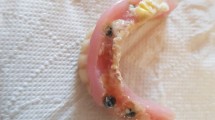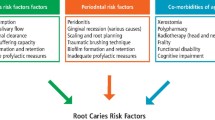Abstract
Older adults often experience poorer levels of oral health than younger adults, especially if they have become dependent on a third party to support their daily oral care routine. However, the deterioration of oral health does not need to be a part of the ageing process. Most oral diseases are largely preventable with the daily removal of dental plaque that forms on teeth and dentures, using a fluoride toothpaste, eating a healthy diet and reducing any tobacco consumption. The dental team have a duty of care to ensure that older people receive evidence-based oral health preventative advice tailored to the individual, taking into account individual risk factors that can increase with age. This can include the clinical application of topical fluoride and minimally invasive dentistry. Older people at an increased risk of poor oral health include those with cognitive conditions, physical impairments and certain medical conditions. Care home residents face particular barriers to attaining a satisfactory standard of oral care which are discussed herein. Good oral health preventative routines must be established early after the diagnosis of progressive chronic conditions and will help to prevent the need for dental intervention later in life when treatment can be more difficult to tolerate. Inclusion of oral health prevention within health policy and legislation is necessary to improve the oral health for older people living in all health and care settings.
Key points
-
Adaptations to mouth care products can help older people independently clean their mouths for longer.
-
Care staff in hospitals and care homes must undertake oral health assessments to assess oral health risk factors and the level of support needed.
-
A range of behavioural techniques may be needed to provide effective daily mouth care for adults with cognitive conditions to maintain oral health.
This is a preview of subscription content, access via your institution
Access options
Subscribe to this journal
Receive 24 print issues and online access
$259.00 per year
only $10.79 per issue
Buy this article
- Purchase on Springer Link
- Instant access to full article PDF
Prices may be subject to local taxes which are calculated during checkout





Similar content being viewed by others
References
Abe S, Ishihara K, Adachi M, Okuda K. Tongue-coating as risk indicator for aspiration pneumonia in edentate elderly. Arch Gerontol Geriatr 2008; 47: 267-275.
Matsui M, Chosa N, Shimoyama Y, Minami K, Kimura S, Kishi M. Effects of tongue cleaning on bacterial flora in tongue coating and dental plaque: a crossover study. BMC Oral Health 2014; 14: 4.
UK Government. Oral swabs with a foam head - heads may detach during use. 2014. Available at https://www.gov.uk/drug-device-alerts/medical-device-alert-oral-swabs-with-a-foam-head-heads-may-detach-during-use (accessed 2021).
Pearson L S, Hutton J L. A controlled trial to compare the ability of foam swabs and toothbrushes to remove dental plaque. J Adv Nurs 2002; 39: 480-489.
Brennan L J, Strauss J. Cognitive impairment in older adults and oral health considerations. Dent Clin North Am 2014; 58: 815-828.
Jablonski R A, Kolanowski A, Therrien B, Mahoney E K, Kassab C, Leslie D L. Reducing care-resistant behaviours during oral hygiene in persons with dementia. BMC Oral Health 2011; 11: 30.
Oral Health Foundation. White Paper on Optimal Care and Maintenance of Full Dentures for Oral and General Health. Available at https://www.dentalhealth.org/Handlers/Download.ashx?IDMF=8a8a723a-20c5-4064-8f37-1947ab94481a (accessed 2021).
Ochi N, Yamane H, Honda Y, Takigawa N. Accidental aspiration of denture cleanser tablets caused severe mucosal oedema in upper airway: accidental aspiration of denture cleanser tablets. Clin Respir J 2018; 12: 291-294.
Iinuma T, Arai Y, Abe Y et al. Denture wearing during sleep doubles the risk of pneumonia in the very elderly. J Dent Res 2015; 94: 28-36.
Mann J, Doshi M. An investigation into denture loss in hospitals in Kent, Surrey and Sussex. Br Dent J 2017; 223: 435-438.
Hashem I W, Gillway D, Doshi M. Dental care pathways for adult inpatients in an acute hospital: a five-year service evaluation. Br Dent J 2020; 228: 687-692.
Acknowledgements
The BDJ Editorial Team would like to thank the authors of this chapter for granting us permission to republish their chapter within our journal. This chapter was first originally published in Rosalyn Davies and Mili Doshi, Oral Health and Dental Care in the Ageing Population, BDJ Clinician's Guides, https://doi.org/10.1007/978-3-031-10224-0_5, © Springer Nature Switzerland AG 2022.
Author information
Authors and Affiliations
Corresponding author
Rights and permissions
Springer Nature or its licensor (e.g. a society or other partner) holds exclusive rights to this article under a publishing agreement with the author(s) or other rightsholder(s); author self-archiving of the accepted manuscript version of this article is solely governed by the terms of such publishing agreement and applicable law.
About this article
Cite this article
Davies, R., Doshi, M. Prevention of oral diseases for the older person (Part 2). Br Dent J 236, 100–104 (2024). https://doi.org/10.1038/s41415-023-6608-9
Published:
Issue Date:
DOI: https://doi.org/10.1038/s41415-023-6608-9



